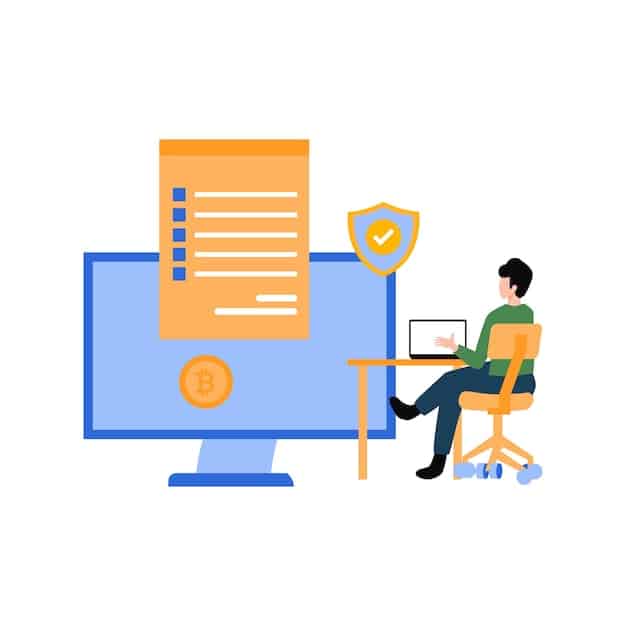Data Privacy Now: New Laws Empowering Your Online Control

The Latest on Data Privacy: How New Laws Aim to Give You More Control Over Your Personal Information Online, emphasizes the increasing importance of data privacy regulations designed to protect consumers’ personal information and grant them greater control over how their data is collected, used, and shared online.
In an increasingly digital world, concerns about online privacy are more prevalent than ever, and understanding the latest on data privacy: how new laws aim to give you more control over your personal information online is critical to safeguarding your digital footprint.
Understanding the Evolving Landscape of Data Privacy
Data privacy is not a static concept; it’s constantly evolving in response to technological advancements and shifting societal values. This section explores the core principles behind data privacy and how they are being reshaped by new legal frameworks.
As our digital lives become more intertwined with daily routines, understanding the basics of data privacy becomes increasingly important. Let’s dive into what makes data privacy so critical in today’s interconnected world.
What is Data Privacy?
Data privacy refers to the appropriate use, handling, and governance of personal information. It encompasses various aspects, including the right to control how your data is collected, used, and shared. It’s not just about keeping data secret; it’s about ensuring transparency and accountability in how personal information is processed.
Why is Data Privacy Important?
In an age where personal data fuels targeted advertising, personalized services, and even automated decision-making, controlling your data is crucial. Without adequate privacy safeguards, personal information can be misused, leading to identity theft, discrimination, or unwanted surveillance. Here are some reasons privacy matters:
- Protection from Identity Theft: Data privacy measures protect your sensitive data from falling into the wrong hands.
- Maintaining Personal Autonomy: You have the right to decide who gets access to your personal information and how it’s used.
- Preventing Discrimination: Data privacy safeguards prevent businesses and organizations from unfairly discriminating against individuals based on their personal information.
Understanding the core principles and recognizing the importance of data privacy helps individuals navigate the increasingly complex digital landscape with more confidence and control. These changing guidelines underscore the importance of staying informed for proactive monitoring and digital life protection.
Key Data Privacy Laws Around the World
To protect citizen’s data, governments worldwide are enacting bold laws that define how organizations can collect, process, and store personal data. Let’s explore some of the most influential data privacy laws shaping the digital landscape.
Data privacy laws are being updated and introduced globally, each one having a unique emphasis. Let’s explore some of the critical pieces of legislation that empower users and regulate the collection of personal information.
General Data Protection Regulation (GDPR)
The GDPR, implemented by the European Union (EU), is one of the most comprehensive data protection laws globally. It grants EU citizens extensive rights over their personal data, including the right to access, rectify, and erase their data. GDPR also requires organizations to obtain explicit consent for data processing activities.
California Consumer Privacy Act (CCPA)
The CCPA gives California residents significant control over their personal information. Some key provisions include the right to know what personal information businesses collect about them, the right to delete personal information, and the right to opt-out of the sale of personal information.

Other Notable Data Privacy Laws
Beyond GDPR and CCPA, numerous countries and regions have enacted their own data privacy laws. Here are a few more key examples:
- Brazil’s Lei Geral de Proteção de Dados (LGPD): Inspired by GDPR, LGPD regulates the processing of personal data in Brazil, providing individuals with similar rights and protections.
- Canada’s Personal Information Protection and Electronic Documents Act (PIPEDA): This act governs how private sector organizations collect, use, and disclose personal information in Canada.
- India’s Personal Data Protection Bill: This bill, when passed, will establish a comprehensive framework for data protection in India, granting individuals rights and imposing obligations on data controllers.
These laws collectively reflect a global trend toward recognizing data privacy as a fundamental right and empowering individuals with greater control over their personal information. Awareness of these laws is crucial for both consumers and organizations operating in the digital age.
Understanding Your Rights Under New Data Privacy Laws
Data protection laws provide a powerful array of rights that empower individuals to take control of their digital identities. It’s crucial to understand these provisions to effectively manage your online presence. Let’s dig into some of the key rights you possess under new data privacy laws to help you become an informed and proactive digital citizen.
Here are some of the core rights you should understand:
Right to Access
The right to access enables you to request a copy of the personal data that an organization holds about you. This allows you to review your information and ensure its accuracy.
Right to Rectification
If you find that the personal data an organization has about you is inaccurate or incomplete, you have the right to request that it be corrected or updated. You want to make sure the digital representation that’s out there is accurate.
Right to Erasure (Right to Be Forgotten)
The right to erasure, also known as the “right to be forgotten,” allows you to request the deletion of your personal data under certain circumstances, such as when the data is no longer necessary for the purpose for which it was collected.
Right to Object
You have the right to object to the processing of your personal data for certain purposes, such as direct marketing or profiling. This means you can limit the ways in which your data is used.

Right to Data Portability
With the right to data portability, you can request that your personal data be transferred to another organization in a structured, commonly used, and machine-readable format. This promotes interoperability and empowers you to switch service providers easily.
Understanding the breadth and scope of these rights equips you to navigate the digital world with increased confidence, safeguarding your privacy and personal information.
How to Exercise Your Data Privacy Rights
To effectively leverage these rights, it’s important to learn how to exercise them. Let’s discuss a step-by-step guide to help you take control of your data and assert your privacy rights.
With a solid understanding of your rights, you can take action to protect your digital footprint. Here’s how to exercise your rights effectively, transforming awareness into action.
Identify Data Controllers
Start by identifying the organizations that collect and process your personal data. This might include social media platforms, e-commerce websites, banks, and healthcare providers. Make a list of all the places your information may reside.
Review Privacy Policies
Familiarize yourself with the privacy policies of these organizations. Privacy policies detail how your data is collected, used, and protected. Reviewing them can uncover important information about your rights and options.
Submit Data Requests
To exercise your rights, submit data requests to the relevant organizations per the specific right you wish to exercise. This might involve requesting access to your data, asking for corrections, or objecting to certain processing activities.
Follow Up and Escalate
If you don’t receive a timely or satisfactory response to your data request, follow up with the organization. If necessary, consider escalating the issue to a data protection authority or seeking legal advice.
- Document Everything: Keep a record of all your communications, data requests, and responses from organizations.
- Set Reminders: Use calendar reminders or tools to stay organized and follow up as needed.
- Seek Professional Help: Don’t hesitate to seek legal advice or consult with a data privacy expert.
Taking these steps empowers you to stay informed, proactive and in control of your personal data.
Practical Tips for Enhancing Your Online Privacy
In addition to understanding legal rights, there are numerous steps you can take to enhance your online privacy. This section highlights tips and best practices for protecting your personal information.
Let’s explore actionable tips that can help you improve your online privacy, taking real steps to protect your personal information in the digital landscape.
Use Strong Passwords
Create strong, unique passwords for all your online accounts. Use a combination of letters, numbers, and symbols, and avoid using easily guessable information.
Enable Two-Factor Authentication (2FA)
Whenever possible, enable 2FA for your accounts. 2FA adds an extra layer of security by requiring a second verification method, such as a code sent to your phone, in addition to your password.
Adjust Privacy Settings
Review and adjust the privacy settings on your social media accounts and other online platforms. Limit who can see your posts, photos, and personal information.
Use Privacy-Focused Browsers and Search Engines
Consider using privacy-focused browsers and search engines that don’t track your browsing history or collect personal data. Some popular options include DuckDuckGo, Brave Browser, and Firefox with privacy add-ons.
- Regularly Clear Your Browsing History: Clear your browsing history, cookies, and cache on a regular basis to remove traces of your online activity.
- Use a Virtual Private Network (VPN): Use a VPN to encrypt your internet traffic and mask your IP address, protecting your online activity from surveillance.
- Be Cautious of Phishing Scams: Be wary of suspicious emails or messages asking for personal information. Verify the sender’s identity before providing any data.
By implementing these practical tips, you can significantly enhance your online privacy and reduce your risk of data breaches and privacy violations.
The Future of Data Privacy: Trends and Predictions
Data privacy is an evolving field. It’s crucial to consider where it is headed in the future. This section highlights emerging trends and predictions in data privacy.
As technological advancements continue to shape our world, the future of data privacy will likely be defined by these key trends:
Increased Regulation and Enforcement
Governments worldwide are expected to ramp up regulation and enforcement of data privacy laws. This may include stricter penalties for violations and increased resources for data protection authorities.
Enhanced Privacy Technologies
Advancements in privacy-enhancing technologies (PETs) are expected to play a crucial role in data privacy. PETs include techniques like differential privacy, homomorphic encryption, and federated learning.
Growing Consumer Awareness and Activism
Consumers are becoming increasingly aware of data privacy issues and are demanding greater control over their personal information. This growing awareness is likely to fuel activism and advocacy for stronger privacy protections.
Data Privacy as a Competitive Differentiator
Businesses that prioritize data privacy and transparency are likely to gain a competitive edge. Consumers are increasingly choosing to do business with companies that respect their privacy.
- Data Minimization: Organizations will need to focus on collecting only the data they truly need and deleting data when it’s no longer necessary.
- Transparency and Explainability: Organizations will face increasing pressure to be transparent about how they use data and to explain their decision-making processes.
- Ethical AI: As AI becomes more prevalent, organizations will need to ensure that their AI systems are ethical, fair, and respect privacy.
The future of data privacy will be shaped by a combination of regulation, technology, consumer activism, and business incentives. Staying informed about these trends is essential for navigating the evolving digital landscape.
| Key Point | Brief Description |
|---|---|
| 🛡️ Data Privacy Rights | Access, correct, erase, object, and data portability are your key rights. |
| 🔒 Protection Measures | Employ strong passwords, enable 2FA, and adjust privacy settings. |
| 🌐 Key Privacy Laws | GDPR and CCPA have been enacted to protect consumer data globally. |
| 📈 Future Trends | Increased regulations, enhanced technology, and consumer awareness are emerging. |
Frequently Asked Questions (FAQ)
▼
The main goal of data privacy laws such as GDPR and CCPA is to ensure individuals have more control over their personal data, including how it’s collected, used, and shared by organizations.
▼
You can request access to your data by submitting a formal request to the company’s data protection officer or privacy department, following the procedures outlined in their privacy policy.
▼
If a company fails to comply, you can lodge a complaint with the appropriate data protection authority in your country or region, and seek legal advice if necessary.
▼
No, data privacy laws typically apply to any organization, regardless of size, that collects and processes personal data, although the specific requirements may vary based on factors like revenue and data volume.
▼
While you can’t entirely opt out of all data collection, you can limit the amount of data shared by adjusting privacy settings, opting out of marketing communications, and using privacy-focused browsers and search engines.
Conclusion
As we’ve explored the evolving landscape of data privacy and how new laws aim to give you more control over your personal information online, it’s imperative to grasp these legal protections and implement essential measures. By understanding your rights, exercising them proactively, and enhancing your online privacy practices, you can confidently safeguard your digital existence and ensure your personal information remains under your control.





